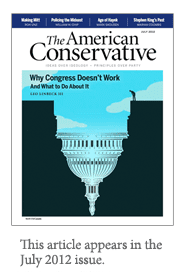Rocky’s Drug War

I had drinks one night with an old friend who had spent the previous year in jail. Despite my entreaties, and my guarantee that it would provide rare cachet, he refused to loudly begin a sentence, “When I was in the joint…” In fact, he denied that prisoners ever called their domicile the joint, the rock, or the big house, and he confessed to not having met a single grizzled veteran of the pen who dispensed such gnomes as “Do time; don’t let time do you.”
You mean the movies lie about all this?
My levity shamed me. There’s really nothing funny about having to live in a cage. My friend’s fellow penmen ranged from the violent to the pathetic, from apparently unredeemable scumbags to the luckless and the dumb. Innocent was seldom an apt description of these men, but look hard enough and you can see the face of Christ in each one.
The prison-industrial complex depends upon the drug war for its seemingly limitless supply of bodies. (I write, by the way, as one so drug-averse that I don’t even like taking Tylenol for a hangover—I much preferred Minor Threat to Johnny Thunders.)
Although we have reached a stage where the jock potheads of my boyhood have their avaricious little hands on the levers of power, the bong throng—including three consecutive deracinated ex-coke-sniffers in the White House—lack the guts even to take the gateway step of saying that to imprison men and women for buying and selling marijuana is an affront to personal liberty. (Not to worry: the empty cells can be filled with Thought Criminals.)
Who are the national political figures willing to say that marijuana ought to be legalized? The noble ascetic Ralph Nader, the heroic physician Ron Paul, and former New Mexico governor Gary Johnson, the triathlete running for president on the Libertarian ticket.
Governor Andrew Cuomo, no one’s idea of a libertarian Democrat, has proposed decriminalizing the open possession of less than 25 grams of marijuana. This is the latest meliorative attempt by New York Democrats to soften the state’s drug laws, which took an infamous turn toward the draconian four decades ago under Governor Nelson Rockefeller.
I am chagrined, if not surprised, that rural upstate legislators are the primary obstacles to reform. Keeping watch over the largely downstate prison population has become a staple of the regional economy, a degradation to which we have become accustomed. Prison jobs sure beat Wal-Mart.
Fifteen miles down the road sits Attica State Prison, damned site of the 1971 riot in which 29 inmates and ten hostages were killed. Governor Rockefeller refused to come to Attica to negotiate for the release of those hostages. Sure, a bloodbath flooded D Yard, but hey, the dead were mostly rural working-class white guards and urban black prisoners. Probably not a one knew anything about abstract expressionism.
I don’t suppose Rocky’s sleep was ever troubled by nightmares of the families whose homes and small businesses he stole for his grotesque experiments in modernist urban renewal in Albany, or by the ghetto and shotgun-shack kids rotting away in his prisons for vending substances which the languid heirs of the ruling class consume with oligarchic immunity.
But God has a sense of humor. Rocky perished while—let’s see; we must be discreet, as the sole witness to his tumbling off this mortal coil is with us still—let us just say that he died while in the company of a 20-something- year-old female. The reliably fatuous New York Times courtier-journalist James “Scotty” Reston provided an unintentionally hilarious eulogy for the Butcher of Attica. Noting that Rocky expired “late on a Friday night” whilst laboring under “the consoling influences of art, beauty, and love,” Reston gushed, “He was a worker, a yearner, and a builder to the end.”
I’ll say!
 The great Mary Harris “Mother” Jones, matriarch of “the fighting army of the working class” and opponent of war, capitalism, and women’s suffrage, once met with President William Howard Taft to plead for a pardon for labor radicals. (Imagine a modern president meeting congenially with a homegrown revolutionary.)
The great Mary Harris “Mother” Jones, matriarch of “the fighting army of the working class” and opponent of war, capitalism, and women’s suffrage, once met with President William Howard Taft to plead for a pardon for labor radicals. (Imagine a modern president meeting congenially with a homegrown revolutionary.)
“Now, Mother,” President Taft said pleasantly, “the trouble lies here: if I put the pardoning power in your hands there would be no one left in the jails.”
“I’m not so sure of that,” Mother Jones replied. “A lot of those who are in would be out, but a lot of those who are out would be in.”
That’s Mother Mary: speaking words of wisdom. Let it be.
Comments